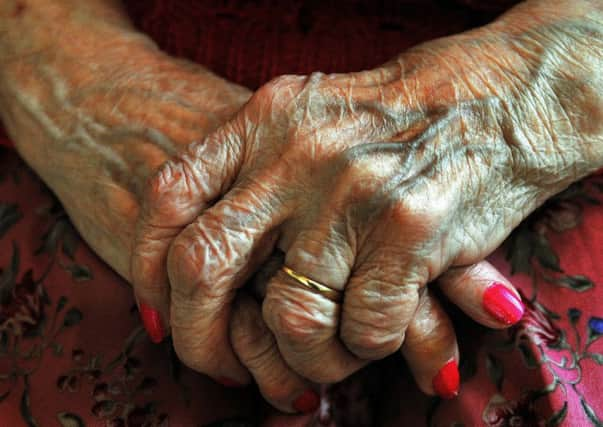Failing social care system '˜leaving elderly at risk and care providers on the brink'


The study, from the King’s Fund and Nuffield Trust, has found that the care older people receive depends on where they live and how rich they are rather than their level of need.
Advertisement
Hide AdAdvertisement
Hide AdReductions in how much local authorities pay care homes – or below inflation increases – means that some are on the brink of collapse, leaving vulnerable people at risk.
The cuts, combined with shortages of nurses and care workers, the introduction of the national living wage for staff and increasing reliance on people who can self-pay means many homes are “under unprecedented pressure”, the report said.
It warned of future firms going bust, similar to the collapse of Southern Cross in 2011, and others leaving the market.
Ruth Thorlby, deputy director of policy at the Nuffield Trust, said: “Local authorities have done their best to make savings while protecting funding for the poorest, but care providers are struggling on the low fees councils can afford.
Advertisement
Hide AdAdvertisement
Hide Ad“Shortages of home care staff and affordable care home places mean older people are often stuck in hospital, putting both their lives and vital NHS processes on hold.
“The number of older people needing care is increasing and yet we are continuing to put less money in.”
Over the past five years, local authority spending on care for older and disabled people has fallen by 11 per cent in real terms and the number of people who receive state-funded help has fallen by around a quarter.
This means growing numbers of people are now outside the system, struggling with basic needs such as washing, dressing or getting out of bed.
Advertisement
Hide AdAdvertisement
Hide AdThe report warned: “No-one has a full picture of what has happened to older people who are no longer entitled to publicly-funded care: the human and financial costs to them and those who care for them are mounting.”
Unpaid carers such as family and friends will be expected to do even more in future, the report added.
It said public spending on adult social care is set to fall to less than one per cent of GDP by 2020, adding that councils “will struggle to meet basic statutory duties”.
The fact care is becoming more about what people can afford means those who are “relatively well off and well informed” will do better than the poorest, “who are reliant on an increasingly threadbare local authority safety net”.
Advertisement
Hide AdAdvertisement
Hide AdThe report also pointed to the rapid growth in delayed discharges from hospital – so-called bed-blocking, which is now at its highest ever level – as a symptom of issues with social care.
Its release coincides with news that controversial plans to close three local authority care homes in Leeds are set for approval by Leeds City Council next week.
Middlecross care home, in Armley, Siegen Manor, in Morley, and The Green, in Seacroft, and their associated day centres all face being shut down following months of consultation.
The move, which is also expected to see two further day centres close and one “remodelled” into a complex needs facility, will save the council £2.5million a year.
Advertisement
Hide AdAdvertisement
Hide AdCoun Rebecca Charlwood, the council’s executive member for health, said: “We simply cannot afford to provide residential and day care in the same way we have in the past, and we must put robust, sustainable models in place now so that older people in Leeds will still have choice and control over the care and support they receive both now and in the future.”
A Department of Health spokesman said: “We understand the social care system is under pressure, and this Government is committed to ensuring those in old age throughout the country can get affordable and dignified care.
“That’s why we have introduced landmark reforms to ensure no-one should have to sell their home to pay for care in their lifetime, and why we’re significantly increasing the amount of money local authorities have access to for social care, by up to £3.5billion by 2020. Our Care Act gave new rights to carers and we will be publishing a new Carers Strategy shortly.”